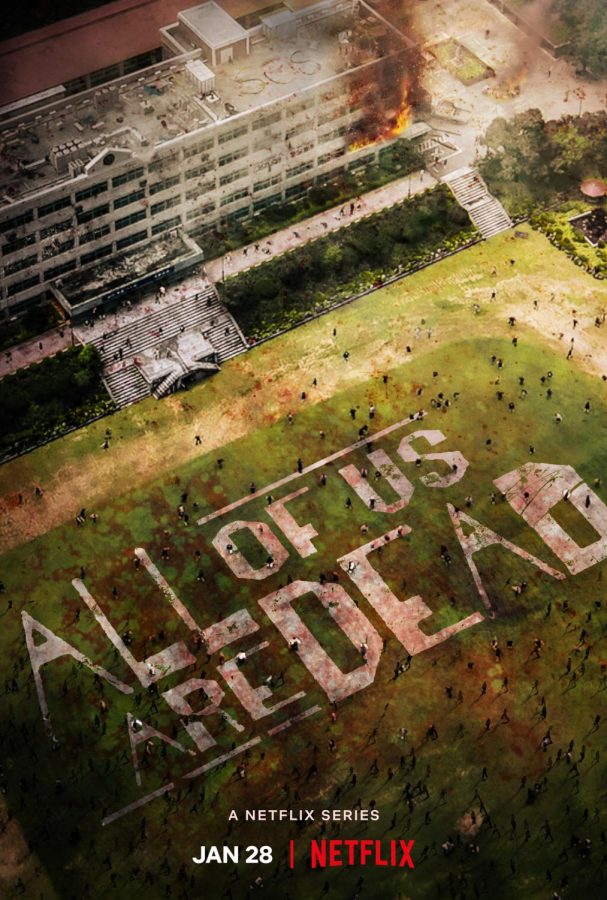“All of Us are Dead” Takes a Deep Dive into the True Killer of Humanity
“All of Us are Dead” offers new insight into a philosophical human crisis, as well as a sizable contribution to the zombie genre.
Zombie films have quite literally amassed throngs of gore-loving viewers to its world of bloodshed and moral paradoxes.
South Korea is certainly no novice to this phenomenon, as award-winning films of this genre have been sweeping across the entertainment industry for years.
The newest one to join the family is Lee Jae Gyu’s “All of Us are Dead,” which gained so much international attention that the Netflix drama spiked to #2 on its opening day. Weeks later, it hasn’t budged from its top ten position.
But what makes this drama unique from the multitude of other zombie films? Are the action-packed scenes as exhilarating as “The Walking Dead?” Are the relationships between the characters as poignant as “Train to Busan?”
The answer actually comes in the age of the drama’s main characters; they’re all teenagers. Not only teenagers, but high school students to be exact; an age group that’s known to be stuck on the precipice between childhood and adulthood.
With some still having hope and others turning to survival, life in a zombie-infested world began to bank heavily on the choice between youth and maturity. In this case, naive hope might just win.
The Jonas virus is a neurodegenerative virus created by science teacher Lee Byeong Chan in an effort to pull his high school son away from the depths of bullying. The virus first targets the body’s white blood cells, and stops the heart merely seconds later. The end result: a zombie.
However, this wasn’t Lee Byeong Chan’s true purpose. His virus drastically raises the body’s testosterone production, where an individual will be consumed with aggression and fury even as a corpse. In other words, fear morphs into murderous anger.
Named after German philosopher, Hans Jonas, the virus is a hidden paradox hidden in the series. Hans Jonas wrote extensively on the dangers of new technologies, and the human responsibility to make these technologies according to the preservation of life.
On the exterior, Jonas’s ideals and the virus could be direct antitheses of each other. However, humanity follows the laws of natural selection like any other organism; would producing a physically superior human being venture too far from “preserving” human life?
This exact question came to plague the students of Hyosan High School, causing a clash of ethics and survival among teenage children.
After Lee Byeong Chan kept an infected rat in the school lab, Hyosan High School became ground zero for the Jonas virus after a student was accidentally bitten.
As discord cascaded over the school, there became a stark contrast in the characteristics of the remaining survivors. Take main lead Lee Cheongsan and the South Korean military for example.
The former could be described as an exception to the primal instincts that overtook most of his peers. Ruled by compassion and responsibility rather than fear, Cheongsan wasn’t at all afraid to sacrifice his own life to protect his friends after being bitten by a zombie.
Similar to him, many of the remaining students retained a crucial sense of empathy, even for their infected peers. Or perhaps it was a simple naivety that came in tandem with blissful youth.
Either way, the military certainly didn’t allow for any hesitation of action after martial law was announced over the Hyosan district. What started as a rescue operation for any survivors at the high school ended with stunned countenances from the survivors, as the rescue helicopter flew away without any students on board.
After learning of a possible mutation of the Jonas virus, the military decided to bomb the entire Hyosan district. Their mission? To eliminate any living beings within that border.
What an apt way to portray the age-old law that rules over all creatures: survival of the fittest.
So, what does it mean to be an adult? As the drama shows, adulthood can be described as the bitter struggle between morality and responsibility in times of crisis.
Humanity is such a peculiar paradox within itself. To be human is to possess an unparalleled perception of ethics. Nevertheless, humans are morally the most terrifying creatures that have ever walked the Earth.
So, for these teenagers who were about to enter the grandiose world of adulthood, they were handed relentless challenges unbefitting of their brief lives.
Festering injustices and social corruption catalyzed the creation of the Jonas virus. Who’s to say that it wouldn’t happen in real life?



